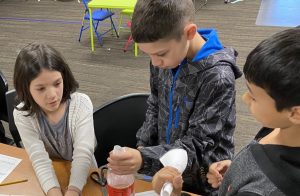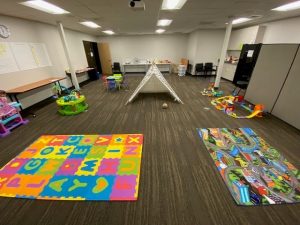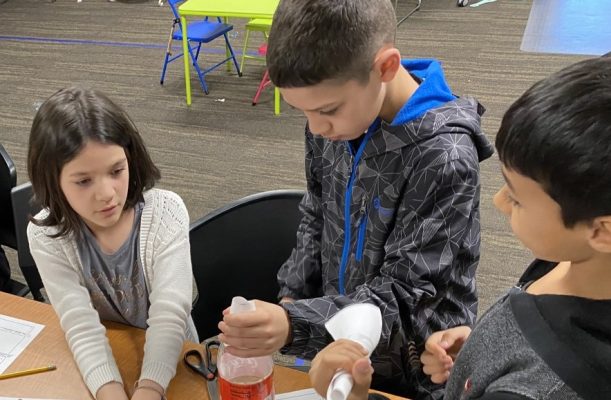Some clinics in the safety net have had to lay off workers. This place had another idea.

When Neighborhood Health Center (NHC) of Oregon got word that the state was ordering a lockdown to protect residents from the new coronavirus, its leaders realized that meant a steep drop in medical visits.
With no end in sight and routine dental care on hold, the Portland-based health center faced the possibility of layoffs for much of its dental staff. Many providers and clinical staff also faced the potential of being unable to work due to childcare issues.
The prospect was a painful one. Within a matter of days, however, the health center came up with an ingenious solution: It would open a childcare center for children of its employees who needed child care.
“We are like a family here,” says Penny L Moore, , NHC’s director of development and communication. “We really care about each other. Clinic employees care passionately about their patients. Our CEO thought that creating our own childcare center would allow NHC to keep everyone employed and also better serve our patients.”
The leadership team quickly found a manager and teacher in-house and staffed it with dental assistants who would otherwise have been furloughed. They also reassigned dentists and some other professionals to new temporary roles, such as working the front desk and doing patient intakes and checkouts. In the heart of the COVID crisis, the childcare center was up and running within five days.
Remarkable as it is, the new day care center is temporary, explains Moore, who worked as a development director for the Cherokee Nation in Oklahoma before moving to Oregon. She explains that NHC’s director of risk worked with the state and the health center’s insurance carrier to develop the temporary day camp, as they call it, for the center’s families during the pandemic. “Once the crisis is over, it will close,” said Moore.” But for now it is a godsend for our staff – they are thrilled to have it.”
Meanwhile, the health center itself is bustling – virtually and otherwise. “We welcome everyone — whether people have health insurance or not, we never turn anyone away,” says Moore. NHC providers first do triage via telehealth with patients who need urgent care or COVID testing before sending them to one of their ILI (“influenza-like illness”) clinics. And in the past few weeks NHC has boosted its telehealth phone and video calls from “very few” before the pandemic to nearly 70 percent to 80 percent of its patient visits. Care management staff are also making daily calls to high-risk patients (65 or older with underlying disorders) to ensure they have access to food and medication and to check on their stress levels.
In one case, an employee realized a patient on the phone was feeling suicidal, so the center called her RN immediately and set up an appointment with a behavioral specialist and primary care provider.
“Afterward the patient felt so much better – she said she didn’t realize she could do telephone visits,” Moore said. “Many patients assume the clinics are closed, so we’re trying to get the word out to everyone that we are very much open and here to serve them.”
From administrative office to day camp in five days
One of the first steps to opening a day camp was finding a manager for the new day care center. Shelly Santa Cruz, Neighborhood’s quality improvement specialist, volunteered immediately.
“I didn’t have formal teaching experience, but I’m skilled with children — in my previous life I spent time as a nanny,” says Santa Cruz, who also has a background in management and music education. NHC leaders also signed up a dental assistant who had also been a credentialed teacher to work with the school-age children on their online assignments and created a day care staff composed of dental assistants.
The next step was setting up the childcare center (or “day camp,” as the students and staff like to call it). Fortunately, Neighborhood had a beautiful new administrative office complete with all the amenities, including as a brand-new kitchen with a microwave, sink, and refrigerator. Administrators wanted to ensure that the children were separated from any adult employees who might visit the offices, so the few administrators working in the office use a different door and keep their distance from the day camp.
As Neighborhood leaders put out a call for supplies, they were gratified to receive an outpouring of materials dear to the hearts of day care and camp directors everywhere: art supplies, glue, scissors, books, puzzles and toys. They made a quick run to Target and WalMart for child-size tables and chairs and other supplies. By the time the kids poured in on opening day, parents were amazed to see how normal it all seemed.
The one thing the health center wasn’t able to pull out of thin air was a playground, but they were able to improvise. The staff takes the kids outdoors for an hour or more each day to explore nearby a patch of grass, kick around a soccer ball and take walks together. “We make sure they get at least an hour a day outside to be in nature and get some fresh air,” says Santa Cruz, adding the children are also able to play and exercise inside.

Credt: Neighborhood Health Center
How does the metamorphosis from QI specialist to day care director feel? Santa Cruz enjoys being around children again – “it’s been really fun and re-energizing being around children again” — and finds her management skills have come in handy for organizing the day’s schedule and students. “After our first big push to get the doors open, we started doing everything from dance hour and kids’ yoga to science experiments, and the kids love that. “I’ve had kids tell me, ‘“This is so fun – I never want to go back to my old day care,” she says.
One of the obvious challenges is complying with COVID safety guidelines, which allow only 10 children to a room. “It can be tricky, since it’s hard to know exactly how many kids will be there each day, but we managed to do it,” she says.
The childcare center also helps kids with reading, math and online school. “That’s good because the parents are putting in long hours and probably the last thing they want to do is homeschool,” Santa Cruz says with a laugh. The dental assistants make sure everyone learns, plays, eats well and – of course – brushes their teeth, even sneaking in some special lessons on dental hygiene.
The care and affection lavished on their children – and the clinic’s rapid innovation — is not lost on the staff.
“The NHC day camp has saved so many of us,” says Patience Rynerson, a referral coordinator at Neighborhood Health Center. “By us, I mean underserved patients, single moms, sole providers, everyone who has been in a position where they were in need of care when it seems unaffordable and inaccessible — a means to feed their family, child care to maintain their careers and contribute to the communities we live in. A lot of us working at NHC aren’t just employees; we are patients, and are very much the population that we serve with the same everyday barriers.”
Rynerson adds that she so appreciated the organization being creative and coming up with a plan to ensure enough staff “to maintain its excellence” in caring for patients as well as seeing that employee’s children were well cared for. “I am seriously proud to be part of this organization,” she says. “In times like these, NHC shows what they truly stand for — communities and care. I don’t know who needs to be thanked for making this miracle happen, but I hope they know how genuinely amazing this is, and that it has not gone unnoticed.”
![]()
VOICES FROM THE FIELD: INNOVATING DURING THE COVID-19 CRISIS
This series is based on the extraordinary work that frontline health care staff are doing in the current public health emergency. Do you want to share a story about COVID-19 and the health care safety net? Please get in touch!
Find this useful or interesting? We’re constantly sharing stuff like this. Sign up to receive our newsletter to stay in the loop.

